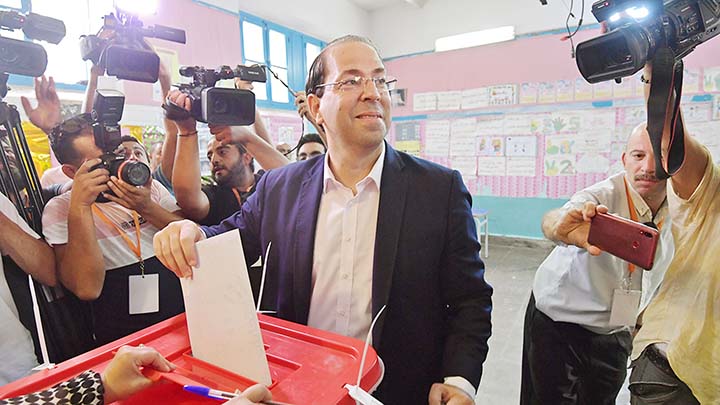
AFP, Tunis :
Rarely has the outcome of an election been so uncertain in Tunisia, the cradle and partial success story of the Arab Spring, as some seven million voters head to the polls Sunday to choose from a crowded field.
Key players include media mogul Nabil Karoui – behind bars due to an ongoing money laundering probe – Abdelfattah Mourou, who heads a first-time bid on behalf of his Islamist inspired Ennahdha party, and Prime Minister Youssef Chahed.
The premier’s popularity has been tarnished by a sluggish economy and a high cost of living, and he has found himself having to vehemently deny accusations that Karoui’s detention since late August is politically inspired.
The election follows an intense campaign beset by personality clashes, albeit one with few clear political differences, brought forward by the death in July of 92-year-old president Beji Caid Essebsi.
He had been elected in the wake of the 2011 revolt that overthrew former dictator Zine El Abidine Ben Ali. Publication of opinion polls has officially been banned since July, but one thing appears sure – many voters remain undecided, due to difficulties in reading a shifting political landscape.
“I am undecided between two candidates – I will decide in the polling booth,” smiled one citizen, Sofiene, who added “honest candidates don’t have much chance of winning”.
Some hopefuls have tried to burnish anti-establishment credentials in a bid to distance themselves from a political elite discredited by personal quarrels.
One key newcomer is Kais Saied, a 61-year-old law professor and expert on constitutional affairs, who has avoided attaching his bid to a political party. Instead, he has gone door-to-door to drum up support for his conservative platform.
·Another independent candidate is Defence Minister Abdelkarim Zbidi, a technocrat who is running for the first time.
However, he has the backing of Essebsi’s Nidaa Tounes party.
The crowded field of 26 has been narrowed slightly by the last minute withdrawal of two candidates in favour of Zbidi – former political adviser Mohsen Marzouk and businessman Slim Riahi, just ahead of Saturday’s campaign blackout.
But it is Karoui’s detention, just 10 days ahead of the start of the campaign, which has been one of the biggest talking points. Studies suggest his arrest boosted his popularity.
A controversial businessman, Karoui built his appeal by using his Nessma television channel to launch charity campaigns, handing out food aid to some of the country’s poorest.
But his detractors portray him as a would-be Silvio Berlusconi, the former Italian premier who they allege partly owns his channel.
On Friday, an appeal to have the Tunisian mogul released from prison ahead of the election was rejected, his party and lawyers said, two days after he began what his defence team said was a hunger strike.
The polarisation between the different camps risks a derailment of the electoral process, according to Michael Ayari, an analyst for the International Crisis Group.

